
Grass
کتاب های مرتبط
- اطلاعات
- نقد و بررسی
- دیدگاه کاربران
نقد و بررسی

April 29, 2019
In telling the difficult, moving story of Korean former “comfort woman” Granny Lee Ok-sun, Gendry-Kim faces a philosophical question as well as an artistic one: what can be redeemed in a life defined largely by cruelty? In swift black brushstrokes that feel both contemporary and, in key wordless pauses, classical, Gendry-Kim follows Ok-sun’s narration of her life (based on interviews) with minimal editorializing. Ok-sun—depicted as a wrinkly old woman in the present day and a round-faced, triangle-nosed girl in her youth—is sold twice as a child into domestic work (though promised she was going to school) in poverty-stricken, occupied Korea before Japanese forces kidnap her. At the Chinese outpost where Japanese soldiers rape her regularly, there is no “comfort,” just a dirty work camp where her visitors, up to forty a day, are “all the same.” When Ok-sun describes her first rape, Gendry-Kim draws six black panels with Ok-sun’s terrified face bursting out of the frame. After the war, Ok-sun finds relative peace, but it’s clear that politicians lack the power and will to enact true healing. The best anyone can hope for, Gendry-Kim seems to conclude, is to say, collectively, “This happened.” Despite occasional moments of disjointed plotting, Gendry-Kim tells Ok-sun’s powerful story with grace, artfulness, and humility; it deserves witness.

October 25, 2019
When she was a child, Granny Lee Ok-sun's impoverished parents sold her to the owner of an udon shop in Busan, who put her to work as a domestic servant. A few years later, at age 15, she was kidnapped while out running errands, loaded onto a train, and delivered to a military base in occupied China, where she spent the remainder of World War II enduring barbaric treatment as a "comfort woman" for soldiers in the Japanese Imperial Army. Instead of presenting a straightforward biography of Ok-sun, South Korean cartoonist Gendry-Kim (De Case En Case) employs a nonlinear narrative structure that flashes between her own impressions of Ok-sun--with whom she conducted a series of interviews in 2015--and Ok-sun's firsthand account of her imprisonment and struggle to move forward after being released at the end of the war. The result is a deeply moving evocation of how decades later Ok-sun continues to process the degradation and despair she survived. VERDICT Gendry-Kim's thoughtful storytelling and exquisite brushwork brilliantly convey Ok-sun's story, producing an uncommonly powerful reading experience about one woman's enduring struggle for agency over her own life and body.--Tom Batten, Grafton, VA
Copyright 2019 Library Journal, LLC Used with permission.

Starred review from October 15, 2019
Few historical tragedies compare to the hell-on-earth endured by the Japanese military's so-called comfort women, a grossly abused term for mostly young girls kidnapped during WWII into sexual slavery. For Lee Ok-sun, one of Korea's few survivors, her service included 30-40 men daily in a remote Japanese brothel in China, where she spent three inhumane years. Born in Busan during Japan's brutal occupation of Korea, she dreamed of school as a young girl but stayed home to raise three younger siblings. Constantly hungry, her parents convinced themselves she could at least eat if she was adopted by strangers. Abused and overworked, she was abducted at 14 while returning from an errand. When Korean graphic novelist Gendry-Kim met Lee, the nonagenarian was living in the House of Sharing, a nursing home caring for comfort women in Gwangju, Korea. As I got to know her, I witnessed her incredible will to survive and her love of life, she writes in her affecting afterword. Over three years, Gendry-Kim worked to recreate Lee's world in stark black-and-white, often using partially or fully blacked-out panels for the unbearably nightmarish scenes. After finally returning to Korea in 2000, Lee continued her activism, determined to shout her story until the Japanese government fully acknowledges and compensates the remaining survivors. Gendry-Kim feeds that tenacious hope with her penultimate image of Lee's smiling, aged face. Hauntingly translated by Hong, Grass proves to be significant, paramount testimony.(Reprinted with permission of Booklist, copyright 2019, American Library Association.)

























دیدگاه کاربران